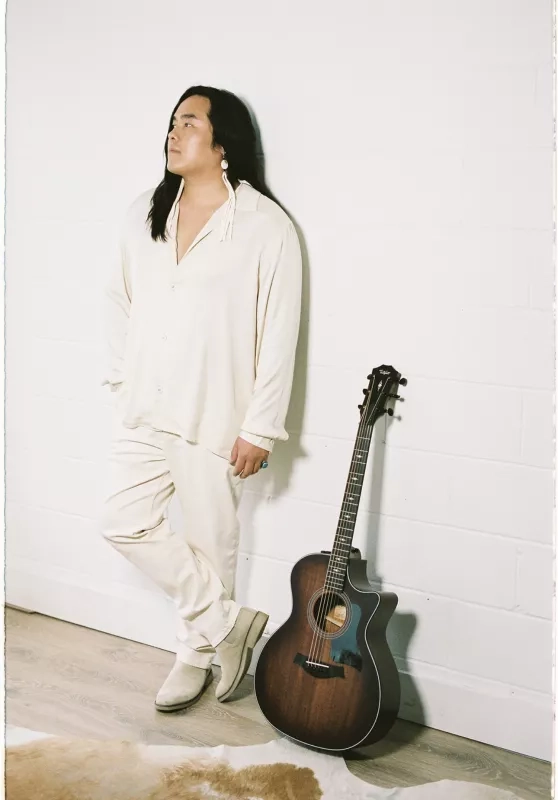
Indigenous Music Award winner Aysanabee: From off-grid to on stage
3 Minute Read
When Aysanabee ran up on stage at the recent Summer Solstice Indigenous Music Awards to accept his third win of the night as Rising Star of the Year, he was not sure what else he could say in his acceptance speech.
After his first win of the evening, on June 6th, for Radio Song Single of the Year, he graciously acknowledged his late grandfather, for whom his debut album, Watin, is named. He also thanked his record label, Ishkōdé Records, established by Juno Award-winning Métis artist, Amanda Rheaume.
Minutes later, he was back on stage to accept the award for Pop/Alternative/Rock Album of the Year, after performing one of his singles for the crowd at Ottawa’s National Arts Centre in the Asper Theatre.
“I’m glad I had a chance to come back up,” he noted with a grin. “I forgot to mention a few people the first time,” before promptly adding ShoShanna Kish of the Indigenous folk-rock band, Digging Roots.
By the third award, this time presented by CAA North & East Ontario, he had run out of new people to thank but ran down the list anyway.
Backstage, one of the stagehands laughed. “You’re not seeing much of the show from your seats!”

It is a situation the Oji-Cree multi-instrumentalist and singer-songwriter from the remote fly-in Sucker Clan community in the Sandy Lake First Nation is just going to have to get used to.
After releasing his 2022 debut album on Ishkōdé Records (an Indigenous women-owned label), Aysanabee has been on the road and was nominated for a 2023 Juno Award.
In an interview with CAA Magazine backstage, Aysanabee (his first name is Evan) was grateful for the honours, but kept them firmly in perspective.
“I want to be happy and healthy, but I want to be able to share music and stories around the world. I am always learning every day and I just want to continue to have the mindset of a music student.”
It is an approach he developed early in life. Growing up off-grid with his mother in Kaministiquia, Ontario, outside Thunder Bay, Aysanabee’s first foray into music came from an oddly tropical source.
When his older brother grew up and moved out, he left behind an old guitar and three CDs. Living off-grid meant electricity came from the home’s generator. When it came on, Aysanabee would grab his brother’s CDs and give them a spin.
“The was nothing else to do, so that’s why I started playing guitar and writing songs, and kind of using my voice to process the world around me,” he says.
And the artist’s CD that most influenced his early musical education? Bob Marley.
In fact, when he moved to the city and formed his first band to perform at a Battle of the Bands, that is who he channelled, much to the astonishment of the audience.
“It was all folk, country, rock, and there’s us playing reggae. We go up there and say we’re going to play an original song that I wrote. And suddenly I started singing with this deep fake Jamaican accent,” he says, chuckling.
These days, he has found his true voice – a rich, bluesy contralto that vibrates with restrained energy as he channels his beloved grandfather’s stories and his own life, which has included stints at a northern mine operation and, until recently, a gig as a CTV News digital content creator.
In fact, it was during ongoing pandemic phone calls to stay in touch with his grandfather that Aysanabee found inspiration for Watin and its singles, including We Were Here and Nomads.
And, if his blue-sky dreams are anything to go by, Canadians can expect to hear a lot more from Aysanabee.
“I want to be playing in stadiums to thousands of people,” he says. “I just want to keep doing this.”
CAA North & East Ontario is a proud sponsor of the Summer Solstice Indigenous Music Awards.

